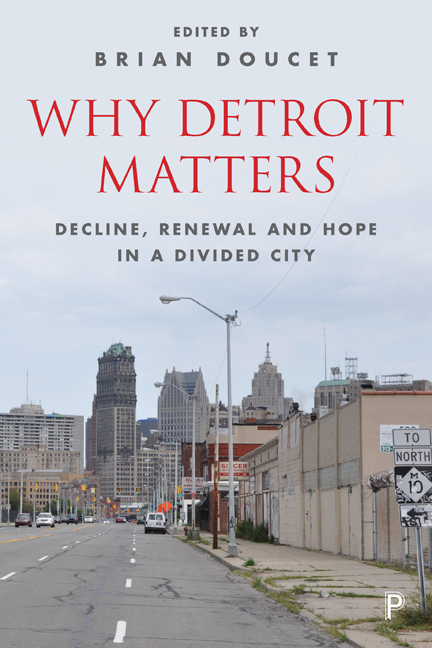Book contents
- Frontmatter
- Contents
- List of contributors
- List of figures and tables
- Acknowledgments
- one Introduction: why Detroit matters
- Section One Lessons from Detroit
- Intermezzo I You may not know my Detroit
- Section Two Practices from Detroit
- Intermezzo II My Detroit
- Section Three Conversations from Detroit
- References
- Index
Intermezzo II - My Detroit
Published online by Cambridge University Press: 05 April 2022
- Frontmatter
- Contents
- List of contributors
- List of figures and tables
- Acknowledgments
- one Introduction: why Detroit matters
- Section One Lessons from Detroit
- Intermezzo I You may not know my Detroit
- Section Two Practices from Detroit
- Intermezzo II My Detroit
- Section Three Conversations from Detroit
- References
- Index
Summary
Quotes by Tyree Guyton:
“When I was five years old, my great-grandmother Katie told me that I would be a great man.”
“At the age of nine, my grandfather put a paintbrush in my hand and it felt like my hand was on fire.”
“What I am saying is that here, in this city, 2 + 2 = 8.”
2 + 2 = 8
The world came to Detroit looking for a chance to be part of the American dream in the early 1950s. At its peak, the city had almost 2 million inhabitants—one of the largest cities in the country at that time.
The time for me was the early 1960s. As a kid growing up on Heidelberg Street, it was great! It was a wonderful place to live, raise a family, and we always had fun. People took great pride in their neighborhoods and jobs were plentiful. The Big Three, which defined the city's largest employers—Chrysler, Ford and General Motors—were always hiring, so one was sure to land a good job. In fact, the Big Three was the reason why the City of Detroit became so largely populated. All races flocked to the D in search of jobs in this booming industry. All of the young kids, myself included, dreamed of owning a car—a dream that was obtainable as most families had at least one car and some had two.
Through the eyes of a 12 year old, there was very little blight. The economy was strong and monies circulated throughout the neighborhoods. It seemed that everywhere you turned, there was a small business, which made each neighborhood sufficient.
The Motown sound was in the air and people were dancing in the streets. I recall hearing Marvin Gaye, the Supremes, and Temptations throughout the radios and record players on every block. At the same time, the Vietnam War was happening and many returned to the States wounded and crazy as hell in the mind. I watched as two of my own brothers tried to fit back into a society that was also at war—black people and white people and the great separation in the City of Detroit.
- Type
- Chapter
- Information
- Why Detroit MattersDecline, Renewal and Hope in a Divided City, pp. 271 - 274Publisher: Bristol University PressPrint publication year: 2017

